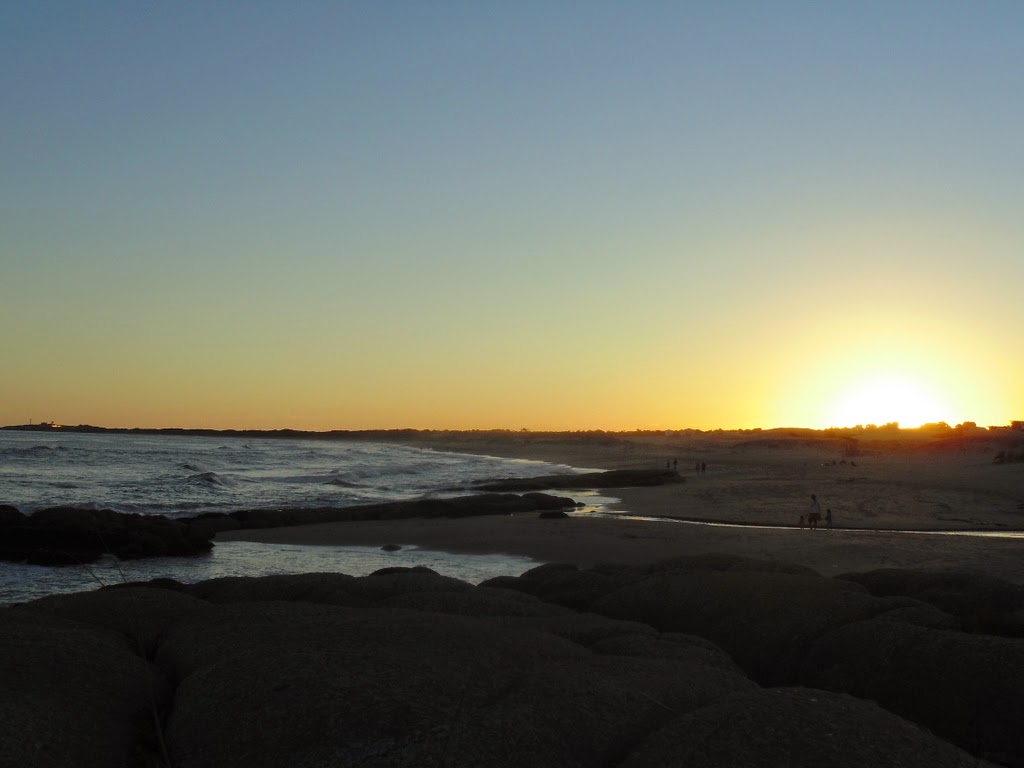Today, the time of 'homes away from
home' will come to an end, and we will once again be on the move. The
destination is clear: the mighty Iguazu Falls, but so far we haven't
quite decided on the best way to get there. For now, we will take the
bus to Salto, about six hours north of Montevideo, and then make
plans how to continue.
When I wrote yesterday's posting we
were on the way back from Punta del Diablo, the easternmost of a
string of small towns along the coast. All of them are popular
holiday destinations for Uruguayans and foreign travellers alike, and
in high season Punta del Diablo must be a busy place. Now, however,
we were told we didn't need to book ahead of time, and so we embarked
on the five hour bus ride Wednesday afternoon.
As pleasant a city as Montevideo is, it
felt good to leave city life behind and rest my eyes on rural scenes
for a change: black and white Holstein cows or herds of Hereford
cattle on green pastures, newly emerged soybean or corn fields or hay
ready to be baled, here and there some unharvested grain fields,
combines at the ready: recent rain seems to have delayed the harvest.
Towns along the way are all designed in
the same pattern: a central plaza
bordered by government building(s), church, police station and
businesses, cobbled, paved or sandy tree-lined streets leading away
from it. The passengers of the bus were almost exclusively locals,
most of them connecting from one of the small towns to another, San
Carlos and Rocha a bit bigger than the rest.
When
we arrived at Punta del Diablo it was close to sunset already: the
trip had taken longer than the designated five hours. We had read in
our travel guide that there was only one paved road leading into
town, but when we arrived we realized that this was a long road to
walk if one had no idea where to start looking for accomodation. We
needn't have worried, however: moments after getting off the bus,
obviously looking a bit undecided, we were approached by a man in a
bright yellow t-shirt with the logo 'La Viuda Hostel'. He was there
to pick up a woman who arrived with the same bus. He had private
rooms available, the price was good, and so we hopped into the
pickup.
This
proved to be an excellent choice: although about 700m from the
closest beach the 'La Viuda Hostel' was a great location, quiet, well
run, clean, with a nice breakfast and a lot of information about
things to do and see.
The
next morning we took a bus to the nearby Sta.Teresa Fort, just
outside the small Sta. Teresa National Park. The fort, a huge
building, was started by the Portuguese in 1762 and finished by the
Spanish in 1775, changing hands during the constant battle for
supremacy in this part of the world. Unfortunately it is open only
from 1 pm to 7 pm, and we would have had to wait for an hour and a
half, so we walked along its massive walls (up to 11.5m high in some
places, and four metres thick at the base) and then slowly made our
way through the forest down to the beach.
 |
| Cormorants waiting for a meal |
A
series of beaches, interrupted by puntas (points)
connects the National Park and Punta del Diablo, and we walked for
about 12 km through the sand, dunes of varying heights to our right,
the ocean to our left, meeting hardly anybody until we got close to
the village. I cannot imagine that it feels really crowded even in
high season, at least on the Playa Grande,
the longest of the beaches. The water is relatively cold, and only a
few people in neopren suits worked on their surfing skills on 'La
Viuda Beach' when we returned there to watch the sunset in the
evening.
Standing
at the bus stop yesterday morning we regretted a little not to have
stayed a day longer, but we had booked the bus to Salto when we were
at the bus terminal in Montevideo, and now there was no turning back.
Off to new shores, then.








No comments:
Post a Comment